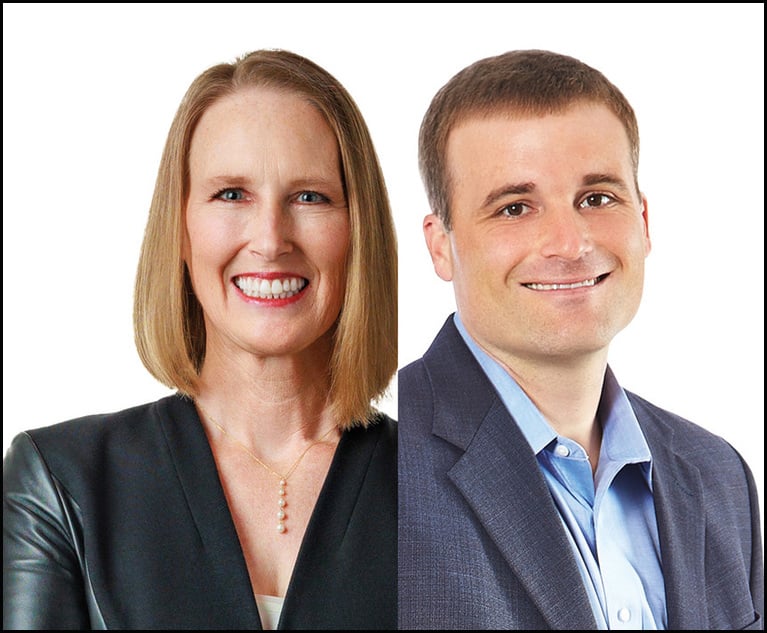Attorney of the Year Nominee: Laurie Webb Daniel
Recalling her days as the newest member of a law firm run by her father and her future husband, "I was always the 'law person' on the trial team,”…
June 19, 2019 at 02:00 PM
6 minute read
 Laurie Webb Daniel, Holland & Knight, Atlanta (Photo: John Disney/ALM)
Laurie Webb Daniel, Holland & Knight, Atlanta (Photo: John Disney/ALM)
Recalling her days as the newest member of a law firm run by her father and her future husband, “I was always the 'law person' on the trial team,” Laurie Daniel said.
“Daddy was a great trial lawyer, but he hated appeals,” she said. “If he won a case, the last thing he wanted was to think about it, so he handed off his appeals to me.”
Webb & Daniel partners Paul Webb Jr. and Laurie's future husband, Harold Daniel, had a reputation for taking complex business cases to trial, Laurie said, “and it was really important to build the appellate record from Day One. You may lose big in front of the jury, but you have to be able to turn it around.”
In 1994, the firm merged with Holland & Knight, where both Laurie and Harold, a former State Bar of Georgia president, remain as partners.
And Laurie remains a key “law person,” overseeing Holland & Knight's national appellate section and the Atlanta office's litigation practice. She represents clients facing high exposure who want every legal angle covered and those reeling from verdicts or judgments they badly want to see reversed.
While jurors might not take much notice of the tall, auburn-haired woman intently taking notes and exchanging whispers with her co-counsel, Daniel has proven remarkably effective at convincing appellate courts to preserve judgments under challenge and to reconsider or jettison rulings by lower courts.
“It's always busy,” said Daniel, backed by a sweeping panorama of Atlanta's skyline at H&K's Midtown office. But, she said, 2018 “was an interesting year”—which is her way of referring to a period including three wins at the state Court of Appeals, two wins at the state Supreme Court and her contribution to a big win at trial.
The Georgia Court of Appeals handed Daniel an early spring victory when it reversed what is widely known as the “$30 million hand verdict.” It's a case stemming from a car wreck in which a woman's hand and arm were badly injured in a collision the defendant driver blamed on mechanics who installed off-road equipment on his Jeep.
The appellate panel reversed the Fulton County verdict and remanded for a new trial, finding the judge had failed to charge the jury on the defendant driver's claim that he had lost control of the Jeep through no fault of his own. The Georgia Supreme Court declined to hear the plaintiff's appeal.
The same day she argued the hand case, Daniel argued before the appeals court that Norfolk Southern Railroad should be granted a new trial after a jury awarded more than $500,000 to a former employee who sued under the Federal Employers' Liability Act.
Daniel argued that the railroad should have been allowed to introduce evidence that the employee was making money off a car repair business he ran on the side while on paid medical leave. The Court of Appeals agreed and ordered a new trial.
Last summer, Daniel was part of the trial team defending textile manufacturer Milliken in a case involving one of five people killed when a private plane hit a power pole on a Milliken plant's property just after taking off from the Thomson-McDuffie County Airport in 2013.
The two-week trial included numerous motion skirmishes and jury instruction wrangles that Daniel led, ending with a defense verdict. (Daniel also was involved in related litigation pitting Milliken against Georgia Power Co. in an indemnification dispute over the crash. The trial judge and Court of Appeals ruled that the utility was shielded from liability, but on June 3 the state Supreme Court reversed and ruled in favor of Milliken, Daniel's client.)
In October, Daniel led a team asking the Court of Appeals court to overturn a Paulding County judge's decision greenlighting an effort to hold U-Haul responsible for any damages accruing from an underlying wrongful death case involving an uninsured driver in one of its vehicles.
The appellate opinion, issued in February 2019, said the judge should have granted U-Haul's motion to dismiss the declaratory judgment action.
Daniel scored two wins at the Georgia Supreme Court last year, as well.
Last June, the justices revived a libel lawsuit a man brought against his former employer, CDC Software, against which he had earlier won a judgment and attorney fees on a breach of contract action.
The trial court said the second suit was barred by the doctrine of res judicata, and the Court of Appeals agreed. But Daniel argued that the lower courts had incorrectly applied the doctrine's standards, and the justices unanimously agreed.
And, in a closely watched litigation funding suit, Daniel successfully argued that the high court should affirm a Court of Appeals decision holding that Georgia's Payday Lending Act and Industrial Loan Act do not apply to litigation funders, because the sums advanced are not “loans” but must only be repaid if there is a recovery.
Judge Chris McFadden of the Court of Appeals, who worked with Daniel to start the state bar's appellate section nearly 20 years ago, praised Daniel. “From where I sit, it appears that most civil defense lawyers turn to her first when they receive an unexpectedly large verdict,” McFadden said.
In addition to serving as Holland & Knight's top appellate lawyer, Daniel remains active in state and national legal circles, including serving two terms as chair of the American Bar Association's Standing Committee on Amicus Curiae Briefs.
Daniel also serves on the board of trustees for the U.S. Supreme Court Historical Society and is quietly working on a project to establish a moot court in Georgia similar to that offered by Georgetown Law's Supreme Court Institute, which allows parties to moot try cases slated to be argued before the U.S. Supreme Court.
“Not everyone has the resources that a big firm like ours has to do that,” she said.
Pointing to pending cases she's involved in, including a challenge to more than $50 million awarded against a corporate client in two related personal injury cases, Daniel said her caseload is unlikely to lessen in the foreseeable future.
“I think jury verdicts in Georgia have been skyrocketing up and up,” she said, noting that just two premises liability trials in recent months netted a combined total of more than $100 million.
“Because I'm an appellate practitioner, I've been pulled into a lot of these cases,” she said.
This content has been archived. It is available through our partners, LexisNexis® and Bloomberg Law.
To view this content, please continue to their sites.
Not a Lexis Subscriber?
Subscribe Now
Not a Bloomberg Law Subscriber?
Subscribe Now
NOT FOR REPRINT
© 2025 ALM Global, LLC, All Rights Reserved. Request academic re-use from www.copyright.com. All other uses, submit a request to [email protected]. For more information visit Asset & Logo Licensing.
You Might Like
View All



Alston & Bird, Baker Hostetler, Holland & Knight Promote Partners in Southeast
5 minute readTrending Stories
- 1'It's Not Going to Be Pretty': PayPal, Capital One Face Novel Class Actions Over 'Poaching' Commissions Owed Influencers
- 211th Circuit Rejects Trump's Emergency Request as DOJ Prepares to Release Special Counsel's Final Report
- 3Supreme Court Takes Up Challenge to ACA Task Force
- 4'Tragedy of Unspeakable Proportions:' Could Edison, DWP, Face Lawsuits Over LA Wildfires?
- 5Meta Pulls Plug on DEI Programs
Who Got The Work
Michael G. Bongiorno, Andrew Scott Dulberg and Elizabeth E. Driscoll from Wilmer Cutler Pickering Hale and Dorr have stepped in to represent Symbotic Inc., an A.I.-enabled technology platform that focuses on increasing supply chain efficiency, and other defendants in a pending shareholder derivative lawsuit. The case, filed Oct. 2 in Massachusetts District Court by the Brown Law Firm on behalf of Stephen Austen, accuses certain officers and directors of misleading investors in regard to Symbotic's potential for margin growth by failing to disclose that the company was not equipped to timely deploy its systems or manage expenses through project delays. The case, assigned to U.S. District Judge Nathaniel M. Gorton, is 1:24-cv-12522, Austen v. Cohen et al.
Who Got The Work
Edmund Polubinski and Marie Killmond of Davis Polk & Wardwell have entered appearances for data platform software development company MongoDB and other defendants in a pending shareholder derivative lawsuit. The action, filed Oct. 7 in New York Southern District Court by the Brown Law Firm, accuses the company's directors and/or officers of falsely expressing confidence in the company’s restructuring of its sales incentive plan and downplaying the severity of decreases in its upfront commitments. The case is 1:24-cv-07594, Roy v. Ittycheria et al.
Who Got The Work
Amy O. Bruchs and Kurt F. Ellison of Michael Best & Friedrich have entered appearances for Epic Systems Corp. in a pending employment discrimination lawsuit. The suit was filed Sept. 7 in Wisconsin Western District Court by Levine Eisberner LLC and Siri & Glimstad on behalf of a project manager who claims that he was wrongfully terminated after applying for a religious exemption to the defendant's COVID-19 vaccine mandate. The case, assigned to U.S. Magistrate Judge Anita Marie Boor, is 3:24-cv-00630, Secker, Nathan v. Epic Systems Corporation.
Who Got The Work
David X. Sullivan, Thomas J. Finn and Gregory A. Hall from McCarter & English have entered appearances for Sunrun Installation Services in a pending civil rights lawsuit. The complaint was filed Sept. 4 in Connecticut District Court by attorney Robert M. Berke on behalf of former employee George Edward Steins, who was arrested and charged with employing an unregistered home improvement salesperson. The complaint alleges that had Sunrun informed the Connecticut Department of Consumer Protection that the plaintiff's employment had ended in 2017 and that he no longer held Sunrun's home improvement contractor license, he would not have been hit with charges, which were dismissed in May 2024. The case, assigned to U.S. District Judge Jeffrey A. Meyer, is 3:24-cv-01423, Steins v. Sunrun, Inc. et al.
Who Got The Work
Greenberg Traurig shareholder Joshua L. Raskin has entered an appearance for boohoo.com UK Ltd. in a pending patent infringement lawsuit. The suit, filed Sept. 3 in Texas Eastern District Court by Rozier Hardt McDonough on behalf of Alto Dynamics, asserts five patents related to an online shopping platform. The case, assigned to U.S. District Judge Rodney Gilstrap, is 2:24-cv-00719, Alto Dynamics, LLC v. boohoo.com UK Limited.
Featured Firms
Law Offices of Gary Martin Hays & Associates, P.C.
(470) 294-1674
Law Offices of Mark E. Salomone
(857) 444-6468
Smith & Hassler
(713) 739-1250






